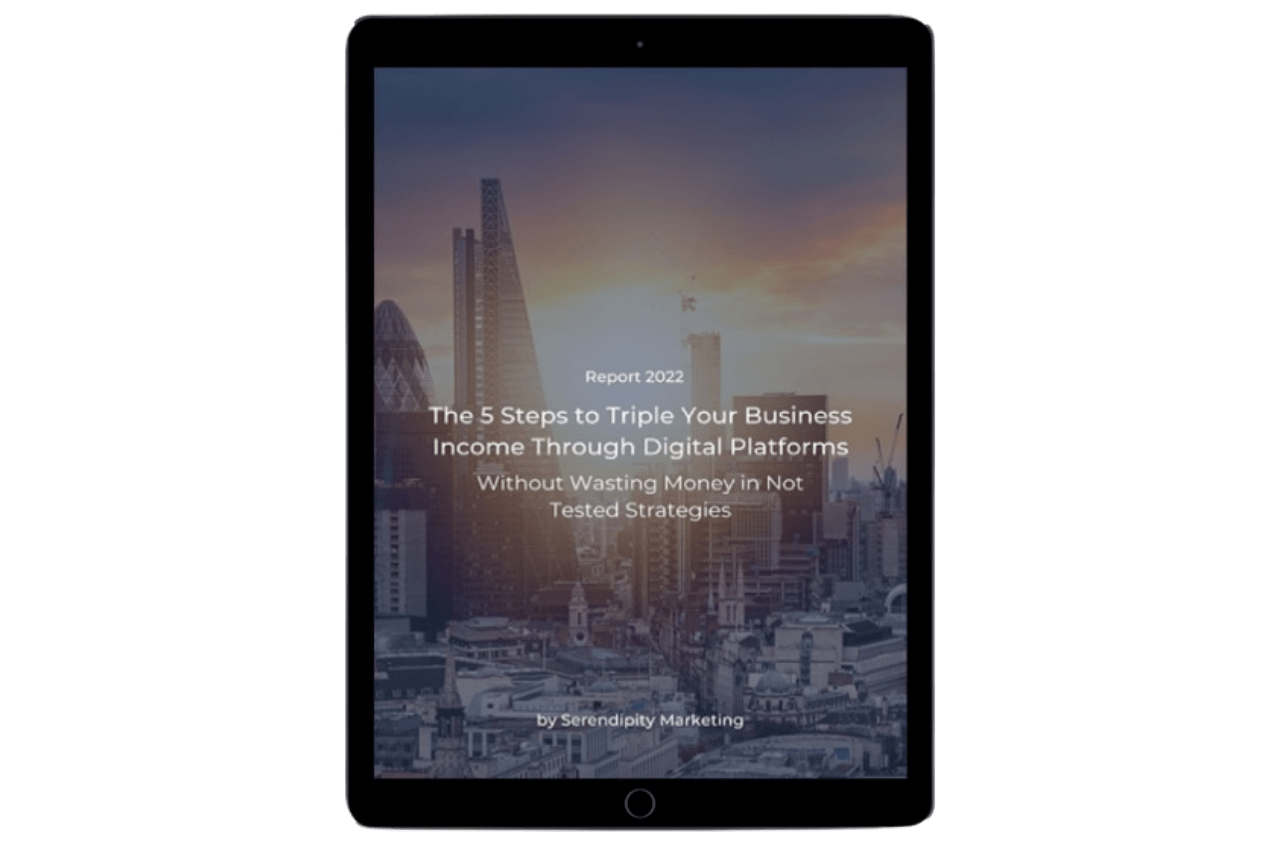Google Analytics has dozens and dozens of reports. But if you’re looking to know how to use Google Analytics to get higher SEO results, what reports should you be looking at?
In this article, we are going to break down the basic reports that you should be looking at to boost your SEO results.
Hi there, and welcome back to Serendipity Marketing. We're a digital marketing agency with a mission to help small businesses grow by applying psychology to their marketing strategies.
Before we get started, please go ahead and follow us on LinkedIn, Facebook, or Instagram.
Now, of course, the first thing that everyone knows to look at is their conversion rate.
If you have goal tracking set up in place, great. If you don't, no worries, you can always end up setting it up, but all you have to do is to go on the left side and click on conversions.
You then have to click on overview and you can end up seeing your conversions for whatever you may be tracking or you may not be monitoring.
And we recommend just setting it up so that you can end up seeing what's converting, what's converting by channel, what's working, and what isn't.
Week-over-week results
Where we would start off within your Google Analytics account is your week-over-week results.
So, click on real-time overview and you'll end up seeing how many people are coming to your website right now.
If now you click on the home button, you'll see a screen with a combination of real-time and your traffic more so week-over-week, and you’ll want to focus on how you're doing week-over-week.
And don't just look at it as pure traffic. Look at it from a country-specific crackerjack or an SEO-specific sort of traffic.
So, whether your website is just in English or multiple languages like ours, you can still get traffic from all over the world.
For example, in English, there are people who visit my site from the UK or from the US, or from India, for example even Canada or Australia.
Now, our digital marketing agency, Serendipity Marketing, at the moment we don't have offices in all of those countries.
So for example, if we get more India traffic, although we love it and eventually we'll expand there, it doesn't necessarily really help us.
So, one thing we like doing is looking at how we are growing or not growing week-over-week within the specific regions that we are targeting.
So, let’s say you market in the UK and in Spain, like us.
You are going to want to compare week by week your general traffic and then scroll down and click on the country under demographics.
There, you can see the traffic you got in that week per country, and you can see how well are performing in the countries where you’re getting traffic the most.
So, at this point, you can click on the countries that you have an interest to target the most, for example, the UK, and select a previous week to compare how the traffic is going.
Now, you can go backwards week by week to see how the traffic is evolving.
In case you notice that over the last 30 days, you’re starting to lose more and more traffic from the UK, most people would just freak out and be thinking that something is going wrong.
And that’s because what most marketers do is that they just look at the total traffic and they're not looking at the total traffic that they can convert or qualify traffic.
For example, let’s say you’re getting more traffic from Spain, as you do work in Spain as well.
And that's great. But you know you still generate more income from the UK due to the currency exchange.
So, you’ll want to focus on the regions that are making me the most, right? Which would be in this case the UK.
We are not saying the other countries aren't amazing. We are just saying that it happens to be where you tend to just generate more revenue from the UK and, as such, you should mainly focus on there.
If you have access to multiple Google Analytics properties, you should talk with other members of your community.
Compare with other sites
One of the big things that people should do is they can look at other sites within your niche or talk to other people and see how they're doing week-over-week.
So, if you get to compare your site with another one, you’ll want to follow the same approach week-over-week.
So, if it's a Thursday, you need compared to Thursday. And if you look at that UK and you see that the other websites as well are losing traffic in the same weeks, it’s safe to assume that that’s something that’s been happening for a lot of the sites in your niche.
And like this, you know a few other players in your niche are experiencing the same.
So, by asking people this and comparing that's one of the first things that you should do to see how you're growing week-over-week because it's deceptive.
Alright, now before we move on with the next tips on how to use Google Analytics, have you ever thought about how much you should invest in marketing to generate constant business growth? Click the button below to calculate the ideal marketing budget you should allocate for higher visibility, engagement, and profit.
How much should you invest in Digital Marketing?
Overall search traffic
The next thing we want you to look at is your overall search traffic. And we want you to do it in two ways.
1. So the first is that you just go to acquisition campaigns, and organic keywords, and you can see how your search traffic is doing again on a regular basis.
And the higher it goes, the more up it goes the better off you are, that's a good trend to look at.
And we recommend looking at this over time and extending it out.
So, let's say, look at it for, the last six-plus months, we recommend you look last year or so, and you just want to make sure overall you're increasing which seems pretty healthy in a positive direction.
Google Search Console
Another thing that we recommend that people do is to go to the Search Console.
So, let's say you do the last 12 months because as we mentioned we recommend that you check out the last year and you can see that Search Console tends to remove all that junk bot traffic.
But we also recommend you filter by the country, so you click on new, click on the country, and you click on the UK or any country that you're targeting.
Typically that list that's ordered the ones at the top is where you get the majority of your search traffic, as you go down on the list you'll get less and less.
Another report that we like looking at is real-time. And if you have enough time traffic, you can click on real-time then content, and you can see where majority of the people are spending their time.
Another report that we like looking at is, as a SEO is your overall traffic, if it's coming from desktop or mobile.
Because if you're monetizing your traffic and you have elements for conversion optimization you have to check to just make sure that you're doing it for all the mobile stuff as well.
Because, for example, on our mobile site we had conversion optimization elements but then when we were looking at my real-time, we realised that most people are actually looking at our amp pages.
And we didn't actually monetize our amp pages because of how they look like.
So, we weren’t actually making much money from mobile traffic, even if it was coming from the UK.
And from that, we learned that we should put some top bar to monetize, so we put that call to action that slides with you and we put a bottom one, and if someone clicks it just takes them to my consulting page.
And as we did that, we started generating more conversions from mobile, specifically our mobile SEO traffic.
Conclusion
These are some of the places we would start off with within your Google Analytics conversions.
Everyone should already have set up and if you don't have that setup, we recommend that you set it up.
And then the rest you can check out and start looking at some of those reports.
The big one to really check out as a marketer and SEO is the week-over-week, and specifically how you're doing week-over-week during that same day, and how you're doing so you would compare, and you look at it based on regional-based traffic which is where you're making your money from.
If you need help with Google Analytics and your SEO marketing to grow your business in terms of visibility, engagement, and profit, contact us today and speak with one of our digital marketing experts to see how we can build the bridge between the point you’re standing at right now and your goals.



